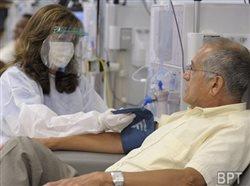Early detection and treatment can slow the progress of kidney disease
(BPT) - More than 26 million Americans have chronic kidney disease (CKD), a progressive loss of kidney function that’s most often caused by diabetes or high blood pressure.
Both kidneys are usually affected by CKD which, if left untreated, may lead to a complete loss of kidney function, or end stage renal disease (ESRD). ESRD is a life-threatening condition, since kidneys play a vital role in cleaning toxins from the blood, as well as providing important hormones for normal body function, and maintaining normal fluid and blood pressure status.
CKD patients whose kidneys are failing need to consider treatment options to replace the lost kidney function, including kidney transplant, hemodialysis or peritoneal dialysis.
The good news is that when CKD is discovered early, a variety of treatment strategies – including medication, exercise and diet changes – can help to either prevent further kidney damage or slow the progression of this life-threatening disease.
That’s why Fresenius Medical Care North America (FMCNA), the nation’s leading network of dialysis facilities, is urging those with high blood pressure, diabetes, cardiovascular disease or a family history of kidney disease to be screened regularly for CKD. The necessary blood and urine tests are simple, inexpensive and can easily be done as part of an annual physical exam.
“It’s much better to know early if you have CKD, because there are often interventions that can slow its progression,” says Dr. Dugan W. Maddux, vice president of Kidney Disease Initiatives at FMCNA. “Especially if you have diabetes or high blood pressure, you need to understand your risks, learn to recognize the symptoms of CKD, and get regular screenings.”
While most people with early-stage CKD experience few symptoms, later stages of the disease can be recognized by changes in urination; swelling of the face, hands or feet; feeling unusually tired; nausea and vomiting; headache, dizziness; severe itching; shortness of breath; and loss of appetite.
The two leading causes of CKD in the U.S. are diabetes and high blood pressure, also known as hypertension. Diabetes, a group of diseases that affect how the body uses blood sugar, accounts for about 44 percent of U.S. patients starting treatment for kidney failure each year. Meanwhile, more than 70 million U.S. adults have elevated blood pressure, which can permanently damage their kidneys over time.
African Americans, Hispanic Americans and other ethnic minorities have higher rates of diabetes and high blood pressure, and are up to four times more likely than non-minorities to experience kidney failure. Smokers, senior citizens and overweight individuals also are more prone to developing kidney disease.
Ten tips for those at risk for kidney disease
Some people can avoid moving to the late stages of kidney disease for a long time under a doctor’s care. The following tips may help to detect CKD early and slow the progression of the disease:
* Be tested for CKD yearly if you have risk factors for CKD including diabetes, high blood pressure, cardiovascular disease or a family history of kidney disease.
* Educate yourself about kidney disease, its symptoms and factors that may increase your risk of developing CKD.
* Stop smoking.
* Exercise at least 30 minutes a day.
* Maintain a healthy body weight.
* Take all medications as prescribed.
* Eat a healthy diet, including low-salt, low-cholesterol foods.
* Control your blood pressure and glucose levels, as directed by your doctor.
* If diagnosed with CKD, work with a dietitian, who may suggest further limiting your salt, potassium and phosphorus.
* If you have CKD, actively work with your health care team to manage your disease.
To learn more about CKD and the different treatments available, FMCNA offers Treatment Options Programs (TOPs), which are open to the public at no cost, at locations around the country. For information or to find a nearby program, call toll-free 877-867-7543, or visit www.UltraCare-Dialysis.com/TOPS.







